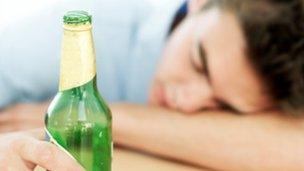Smoking may worsen a hangover, US study finds
- Published

Students keep a diary on the severity of their hangovers
Smoking may worsen a hangover after drinking heavily, a US study reports, although the reason why is unclear.
Researchers asked 113 US students to keep a diary for eight weeks, recording their drinking and smoking habits and any hangover symptoms.
When they drank heavily - around six cans of beer an hour - those who also smoked suffered a worse hangover.
Addiction charities hope this study may motivate smokers to cut down over the festive season.
The study's findings are reported in the Journal of Studies on Alcohol and Drugs.
One of the paper's authors, Dr Damaris Rohsenow, from the Centre for Alcohol and Addiction Studies at Brown University said: "At the same number of drinks, people who smoke more that day are more likely to have a hangover and have more intense hangovers.
"And smoking itself was linked to an increased risk of hangover compared with not smoking at all.
"That raises the likelihood that there is some direct effect of tobacco smoking on hangovers."
A spokesperson from the charity Action on Addiction called for further research, saying the interaction between alcohol and smoking "is complex".
"We welcome evidence-based research in any areas which can be used assist with developing preventative campaigns, particularly for young people who are often experimenting in their teenage years with alcohol, drugs and cigarettes.
"We would hope that for some, knowing that the possibility of worsening a hangover by smoking would help them to decrease drinking, smoking or both," said the spokesperson.
Preventative measures
The students from a Midwestern university in the US reported on the number of drinks consumed, number of cigarettes smoked and their hangover symptoms - which included if they felt more tired than usual, had a headache, felt nauseated and had difficulty concentrating on things.
The researchers then estimated blood alcohol concentration (BAC) which helped control for differences between sexes as it took into account weight and the period over which the student drank alcohol.
After analysing the results, the researchers found that smoking more heavily the day before increased the presence and severity of hangover the next day - but only after a heavy drinking episode, estimated at a BAC of 110mg/dl or greater - the equivalent of around six cans of beer an hour.
The reasons why are unclear- but the study suggests it may down to the pharmacological effects of nicotine on the nervous system.
Amanda Sandford, research manager at Action on Smoking and Health said: "Since alcohol and tobacco both interact with receptors in the brain it is not so surprising that smoking appears to increase the risk of a hangover in people who consume both substances."
Andrew McNeill from the Institute of Alcohol Studies says there is no solution to avoiding hangovers but suggests: "Don't drink too much, don't get dehydrated - have soft drinks between the alcoholic ones - and avoid the darker drinks with the greater hangover potential."
- Published30 December 2011
- Published27 November 2012